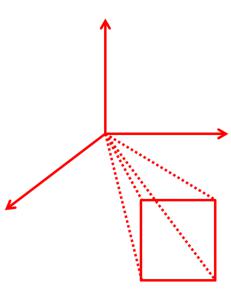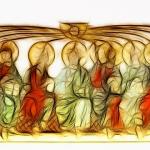Sermon preached at Burke UMC 11/26-27/2011
Text: Isaiah 64:1-9
David Lahti, a British biologist, wrote an article in the Guardian newspaper this week asking “Why does religion keep telling us we’re bad?” Lahti argues that humans have evolved into a relatively “cooperative, sympathetic, even loving species.” He gives the example of an airplane flight, saying that in comparison to other hominids, like gorillas or orangutans, it’s remarkable that a bunch of unrelated adult males can sit together with fertile females in an enclosed space for seven hours without a fight breaking out. A couple of the online comments in response to Lahti’s article are worth relating. One of them said, “You ever been to a night-club, Mr. Lahti?” And right below it: “What about Black Friday?”
Black Friday. A single day on which the full ugliness of American consumerism is put on display for the whole world to see. In 2008, a Walmart employee was trampled to death in upstate New York when the crowd surged through the door at 5 am. Nobody died this year, though several people were hospitalized when they got trampled on the way into the stores. A California woman pepper-sprayed a dozen other shoppers so she could get her X Box. There were only about half a dozen fistfights, down from last year. Only a few people were tasered.
The hysteria of Black Friday is created by the confluence of two powerful anxieties that feed off of each other. On the one hand, you have the anxieties of the retailers. Black Friday got its name because it’s the day each year when many stores go in the black for the first time. Without the Christmas season, most retailers would go under. Thus, they have to compete ferociously from the starting gate in order to survive. On the other side of the equation are American consumers who are consumed by the anxiety of their huge shopping lists. The average US household spends about $1700 on Christmas shopping every year.
I know that some of you went shopping on Friday, and I don’t think there’s anything wrong with trying to save some money. What’s wrong with Black Friday is the hype, which is a symptom of a much deeper problem, the fact that Christmas has turned into the opposite of what it’s supposed to be about. Christmas is not supposed to feed our anxieties; it’s supposed to relieve them.
The “Occupy Best Buy” version of Christmas is a fairly obvious counterfeit of the real holiday, but “Occupy Eggnog” is just as problematic. As much as I love that song “It’s the most wonderful time of the year,” the first one or two times that I hear it each year, Christmas has already lost its meaning in the lyrics of that song. It might “warm our hearts” to sing about mistletoe and jingle bells and sleigh rides and parties where everybody has a cheesy red Santa hat and an awful looking sweater, but that’s not what Christmas is about. Christmas is not the time to put on a fake smile, make pleasant small talk, and drink sweet, creamy intoxicating drinks until you forget that you have any problems. The “Occupy Eggnog” Christmas might not be as violent as “Occupy Best Buy,” but it too is about covering up our anxiety instead of relieving it. We need to occupy the manger instead.
What does it mean to occupy the manger? I imagine some of you rolled your eyes when you heard the title of our sermon series. I know it sounds trendy. But here’s what I think it means. In order to get Christmas, we need to be the type of people who could go into a barn with a bunch of farm workers, fully expecting to find the creator of the universe newly born to a Jewish teenager, wrapped in rags and lying in a donkey’s feeding trough, because that’s what a manger is. A manger is not a cute knickknack that you pull out of a box once a year to put on your mantle so that people will compliment you on your home furnishings when they come over to drink eggnog with you. We’ve got so much to unlearn if we want to learn about the real Christmas. And Isaiah 64 is a great place to start.
Isaiah 64 was originally written for people who thought they’d been abandoned by God because they’d been stepped on, conquered, and exiled by one ancient empire after the other. They had gotten to the end of their rope, so they had to cry to God for help. Maybe some people here can relate to the Israelites’ anguish in this passage, but many of us who have relatively pleasant lives require an extra step to get to where some of you already are. Before we can celebrate the real Christmas, we have to realize that we need God, which means that we have to be bothered enough by His absence in our lives to seek Him out.
Some of us need for God to tear the roof off of our eggnog parties and stop the music so we can start really living instead of spending our lives covering up anxiety. Some of us never made it to the party, and we need God to help us make peace with that. There are many different possible roads that lead us to the place of needing God, but once we get there, it’s a good place to be.
When you need God, you remember what God has done in the past. All the stories of the miracles God has performed for His people that go in one ear and out the other when you’re oblivious to God suddenly become relevant when you realize that you need Him. They become more than an ancient people’s mythological account of phenomenon that we explain through science. They become awesome, unexpected deeds that reveal God’s love for His people.
The more that we allow ourselves to need God, the more we allow ourselves to see His hand at work. It’s all a question of interpretation. When we’re feeling self-sufficient, we don’t include God in the interpretation of our lives: we might see hard work, talent, maybe a bit of luck, but not God’s grace. It’s only when we know our inadequacy that we’re able to experience what God is doing in our lives and see whatever successes we accomplish as reasons to be thankful.
Our gratitude is contingent upon our feeling of inadequacy. This is why righteous deeds, done with an attitude of self-assurance, become like filthy rags. They make us feel adequate, which keeps us from experiencing the need that enables us to see God. I realize that championing inadequacy is counterintuitive in a culture which thinks the most reassuring thing you can say to someone else is “There’s nothing wrong with you.” That’s the least reassuring thing you can say to anxious people because what they hear is “Get some more eggnog and pretend that there’s nothing wrong with you since I don’t have time to hear about it.”
The freedom to be open about our inadequacy is one of the greatest gifts that Jesus gives us because it’s the foundation of any honest relationship. It is an extraordinarily liberating thing to be able to say, “I am unclean” in the presence of God. We come clean with God when we declare ourselves unclean, because what keeps us unclean is our need to hide it underneath our shopping lists and decorations and Christmas smiles. To occupy the manger means to join the community of unclean people gathered in a filthy barn around their savior. And when we join these people who have come clean by declaring themselves unclean, then God can reshape us and put us to good use because we have let our defenses down enough to say, “We are the clay and you are our potter.”
So if your heart is a little bit empty this Christmas season, that’s not something to feel bad about. You’re a step ahead of the rest of us who haven’t stopped to think about what we’re doing. You don’t need to smile and chitchat when you don’t feel like smiling and chitchatting. You don’t need to rush around buying a long list of things that other people don’t need, so it can turn into clutter in their houses. Just come to the manger with all the anxieties and embarrassments that make you feel unclean. We can wait together there for the One who makes us all clean.















